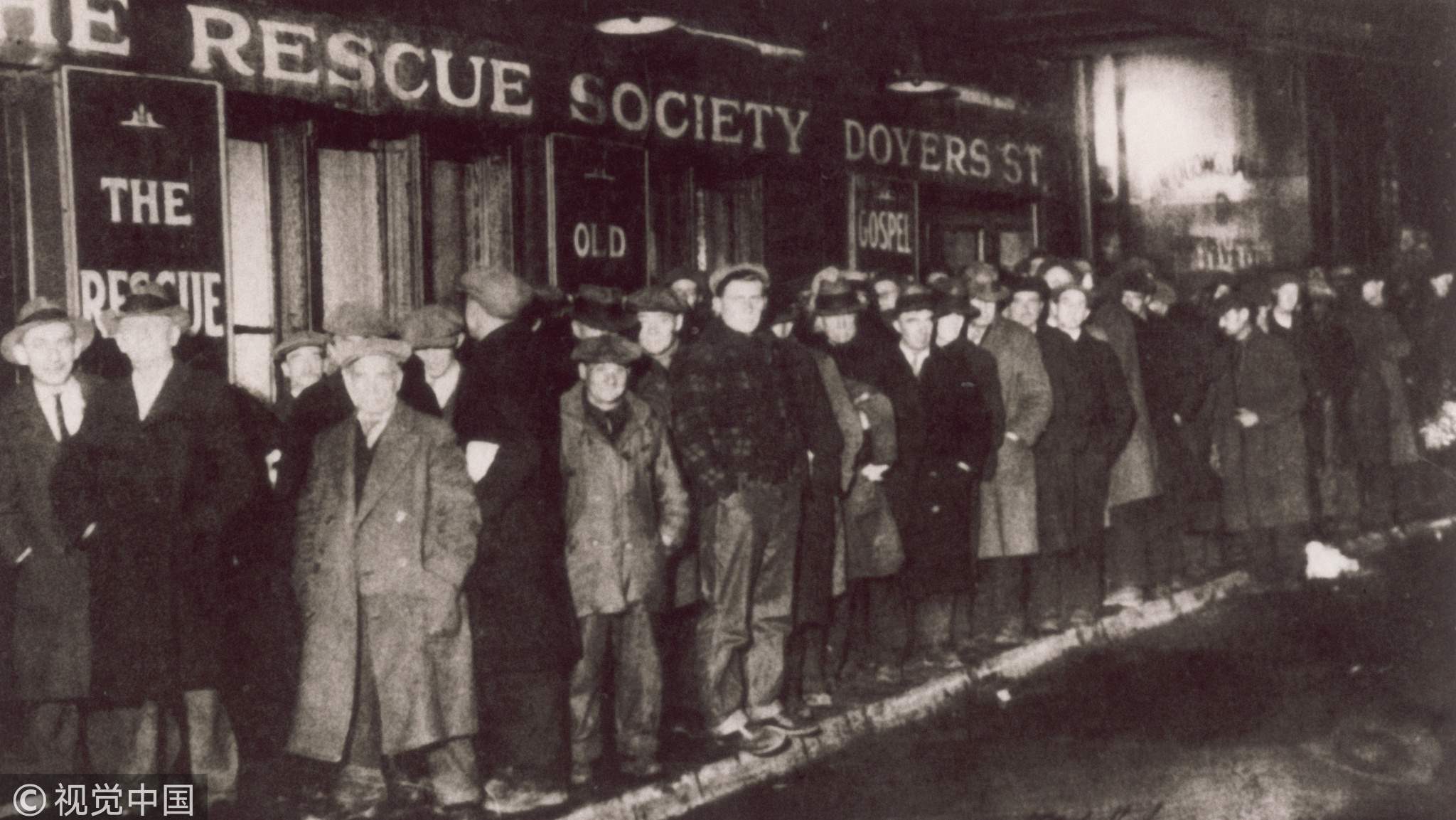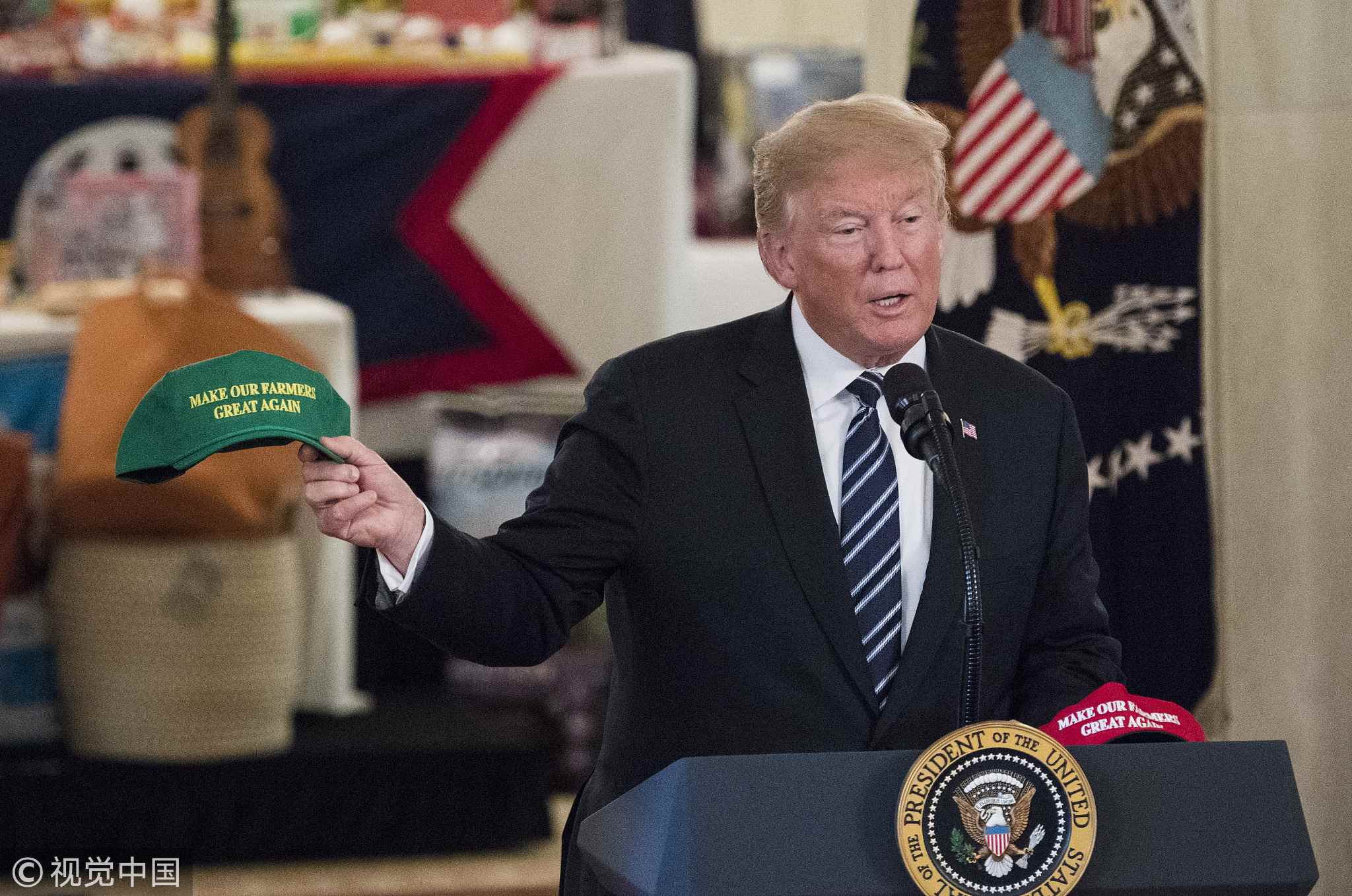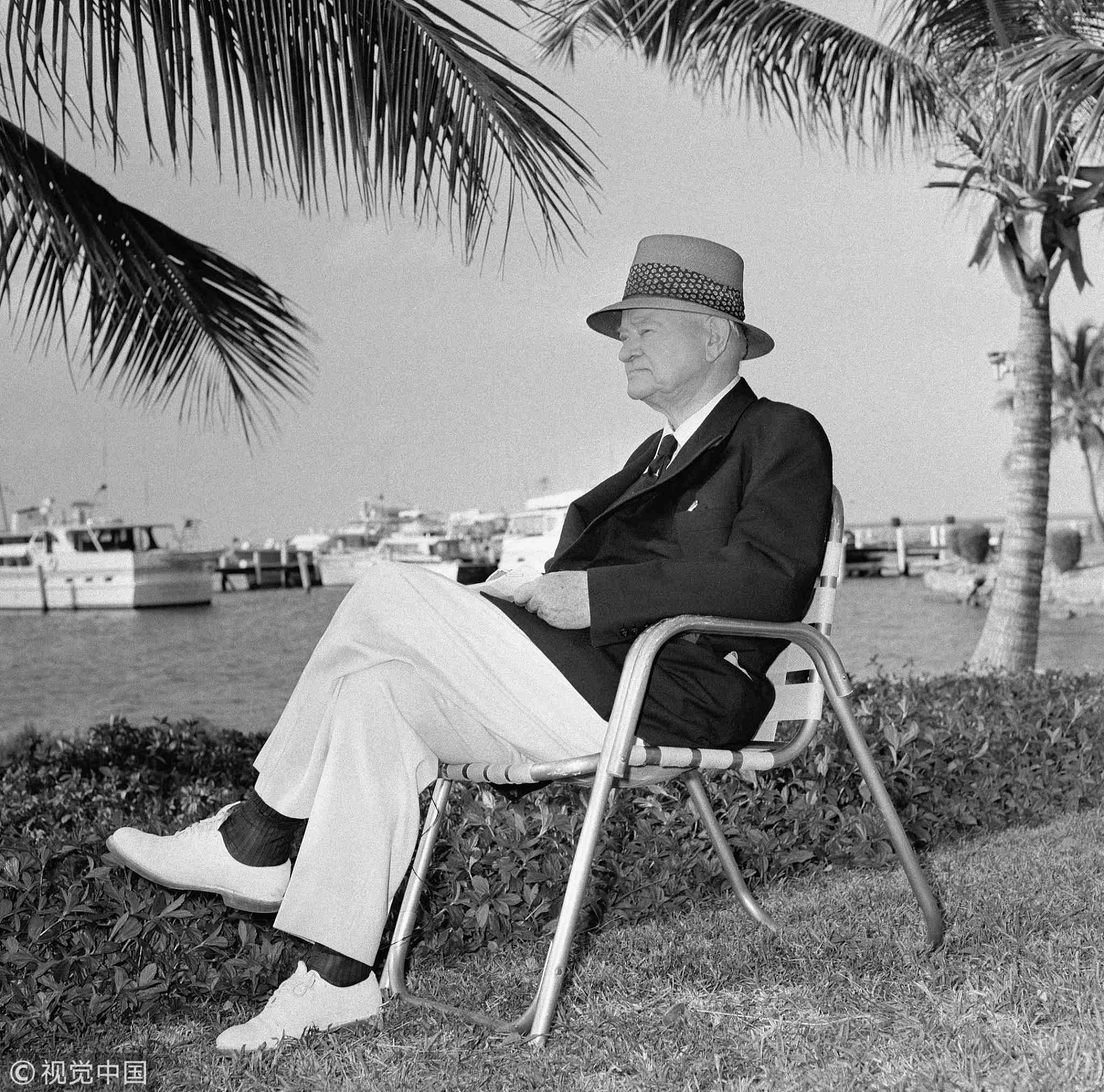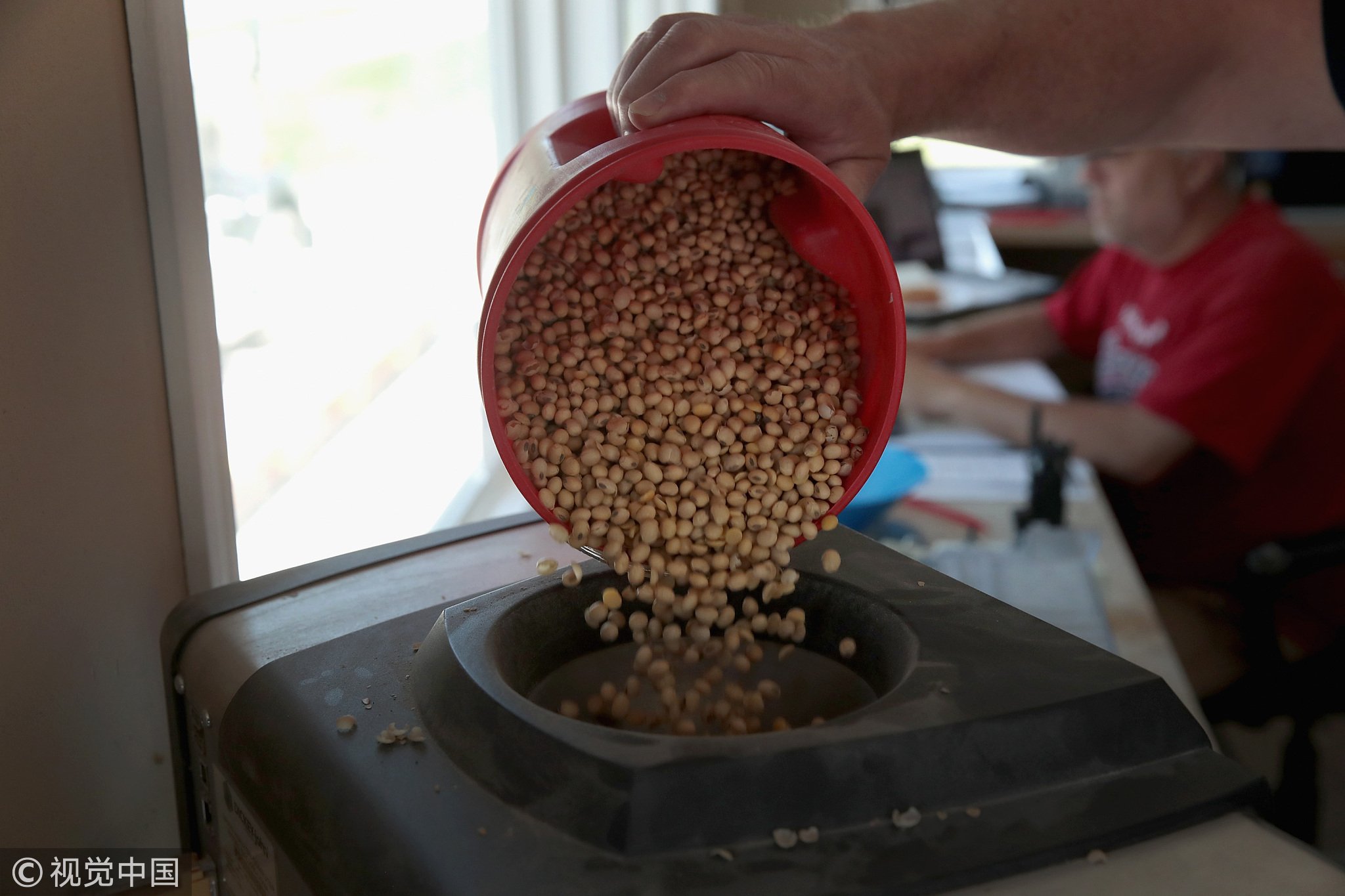
Opinions
22:05, 25-Jul-2018
Opinion: 1929, a cautionary tale for Donald Trump
Updated
21:34, 28-Jul-2018
By Wang Xiaonan

Editor's note: The author is a journalist for CGTN Opinion. The article reflects her views, and not necessarily those of CGTN.
Stories keep emerging from Donald Trump's White House.
The willful septuagenarian unveiled on Tuesday a 12-billion-US-dollar emergency aid package for farmers hurt by the escalating trade war with China.
The surprise announcement came on the heels of the president's threat to place tariffs on all 505 billion US dollars' worth of all Chinese imports. It seems the White House is falling in a once-familiar circle of imposing tariffs, running into counter-tariffs, and then resorting to protectionism for domestic industries.

US President Donald Trump holds a hat reading "Make Our Farmers Great Again," as he speaks on American manufacturing during a Made in America Showcase, at the White House in Washington, DC, July 23, 2018. /VCG Photo
US President Donald Trump holds a hat reading "Make Our Farmers Great Again," as he speaks on American manufacturing during a Made in America Showcase, at the White House in Washington, DC, July 23, 2018. /VCG Photo
The relief plan was welcomed by a bunch of soybean, pork, sorghum, corn, wheat, and dairy farmers who have borne the brunt of Trump's tariff bombast. Estimates put losses for American farmers of soybean, wheat, and corn at 13 billion US dollars. That might explain why Trump took the deliberate move of ringing in the agricultural bailout just days before his visit to the country’s second largest soybean producer – Iowa, also a traditional swing state.
But the program has stoked furor among a number of trade groups as well as Democrats and Republicans alike, who claimed that the makeshift handouts will permanently damage the US agriculture industry and also breach the World Trade Organization's rules. "This administration's tariffs and bailouts aren't going to make America great again, they're just going to make it 1929 again,” said Senator Ben Sasse from Nebraska.
Well, what happened in the year of 1929?
It was a year when the economy was humming across the United States, flirting with a high employment rate, except in one sector – agriculture. Thus, Congress at the time came up with a tariff bill to protect farmers whose pocketbooks were hit amid overproduction as well as vehement competition from European farmers who were recovering from World War I.
But to get the law passed, members of Congress had to endorse each other's proposals of imposing tariffs on different products ranging from eggs to sugar to wool to textile. The snowballing tariffs evolved into the Smoot-Hawley Act, named after a senator and a congressman.

Former US president Herbert Hoover (1874-1964) sits on a chair outside his cottage for an episode of the CBS interview program 'Person to Person,' Key Largo, Florida, in March 1960. /VCG Photo
Former US president Herbert Hoover (1874-1964) sits on a chair outside his cottage for an episode of the CBS interview program 'Person to Person,' Key Largo, Florida, in March 1960. /VCG Photo
A year later, then US President Herbert Hoover, who took to his campaign trail a pledge to raise tariffs on agricultural imports, signed it into law. The act increased duties on more than 20,000 foreign goods imported to the US by as much as 40 to 48 percent – the highest in the country's history. Other countries retaliated with stiff counter-tariffs, making the American people pay more for their everyday living.
The infamous act of protectionism and even isolationism worsened the Great Depression that erupted almost simultaneously. From 1929 to 1933, US exports shrank 61 percent while imports 66 percent. Its GDP fell by some 30 percent. And global trade suffered a contraction of 66 percent over the years.
It all started with a move to protect domestic farmers in 1929, but the consequences were disastrous.
The bleak economic prospects showed little sign of alleviation until then US President Franklin Roosevelt clinched the Reciprocal Trade Agreements Act in 1934, as part of the New Deal policy to reduce tariffs and cooperate with other countries. The US economy recovered through promoting free trade, salvaging the recession resulting from government welfare for industries.
Trump's aid to tariffs-hit farmers under the Commodity Credit Corporation has echoes of the buildup to the Great Depression, as subsidies cannot truly prop up the economy in the long run by stifling the development of American industries. What is truly needed to protect the farmers is allowing them to trade, an important avenue in a globalized world that has lasted for seven decades.

A soybean farmer checks the quality of a load of soybeans being delivered to a Ruff Bros, June 13, 2018. /VCG Photo
A soybean farmer checks the quality of a load of soybeans being delivered to a Ruff Bros, June 13, 2018. /VCG Photo
If Trump insists on protecting farmers – his voter base, and perhaps later other industries as they must cry for the same preferential treatment by distorting the market and applying short-term patches to self-inflicted wounds, not only will the global trading system be torpedoed, but vital American businesses and sectors will suffer, and another Great Depression won't be far off.
By then, it will probably take decades to unravel the circle of tariffs and bailouts, upend America's own economic downturn, and defuse global economic woes triggered by the isolationism of the world's largest economy.
The year 1929 should serve as a cautionary tale for Trump.
(Cover Photo: People at a Maxwell Street market, a poor quarter of Chicago in 1930. /VCG Photo)

SITEMAP
Copyright © 2018 CGTN. Beijing ICP prepared NO.16065310-3
Copyright © 2018 CGTN. Beijing ICP prepared NO.16065310-3